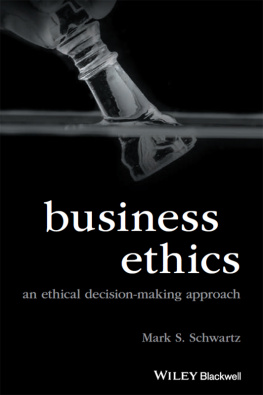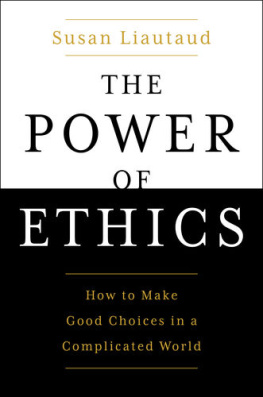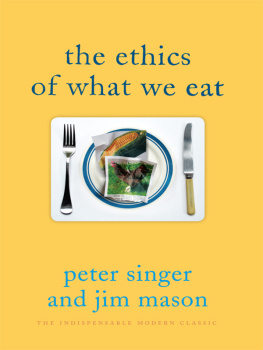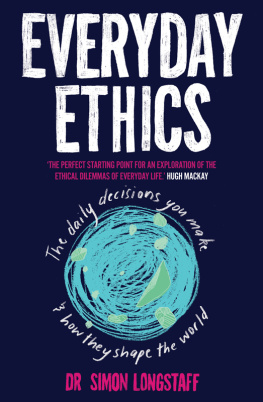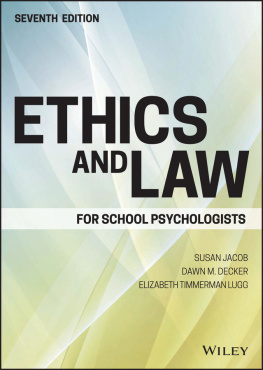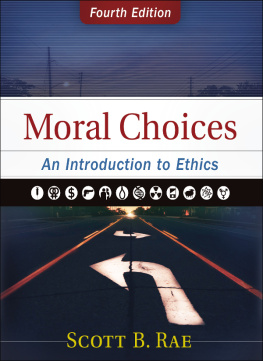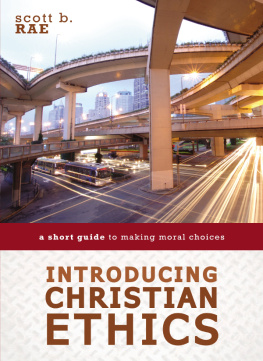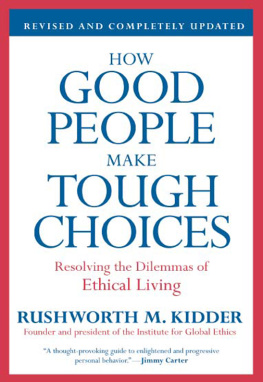Susan Liautaud - The Power of Ethics: How to Make Good Choices In a Complicated World
Here you can read online Susan Liautaud - The Power of Ethics: How to Make Good Choices In a Complicated World full text of the book (entire story) in english for free. Download pdf and epub, get meaning, cover and reviews about this ebook. year: 2021, publisher: Simon & Schuster, genre: Politics. Description of the work, (preface) as well as reviews are available. Best literature library LitArk.com created for fans of good reading and offers a wide selection of genres:
Romance novel
Science fiction
Adventure
Detective
Science
History
Home and family
Prose
Art
Politics
Computer
Non-fiction
Religion
Business
Children
Humor
Choose a favorite category and find really read worthwhile books. Enjoy immersion in the world of imagination, feel the emotions of the characters or learn something new for yourself, make an fascinating discovery.

- Book:The Power of Ethics: How to Make Good Choices In a Complicated World
- Author:
- Publisher:Simon & Schuster
- Genre:
- Year:2021
- Rating:5 / 5
- Favourites:Add to favourites
- Your mark:
- 100
- 1
- 2
- 3
- 4
- 5
The Power of Ethics: How to Make Good Choices In a Complicated World: summary, description and annotation
We offer to read an annotation, description, summary or preface (depends on what the author of the book "The Power of Ethics: How to Make Good Choices In a Complicated World" wrote himself). If you haven't found the necessary information about the book — write in the comments, we will try to find it.
Susan Liautaud: author's other books
Who wrote The Power of Ethics: How to Make Good Choices In a Complicated World? Find out the surname, the name of the author of the book and a list of all author's works by series.
The Power of Ethics: How to Make Good Choices In a Complicated World — read online for free the complete book (whole text) full work
Below is the text of the book, divided by pages. System saving the place of the last page read, allows you to conveniently read the book "The Power of Ethics: How to Make Good Choices In a Complicated World" online for free, without having to search again every time where you left off. Put a bookmark, and you can go to the page where you finished reading at any time.
Font size:
Interval:
Bookmark:
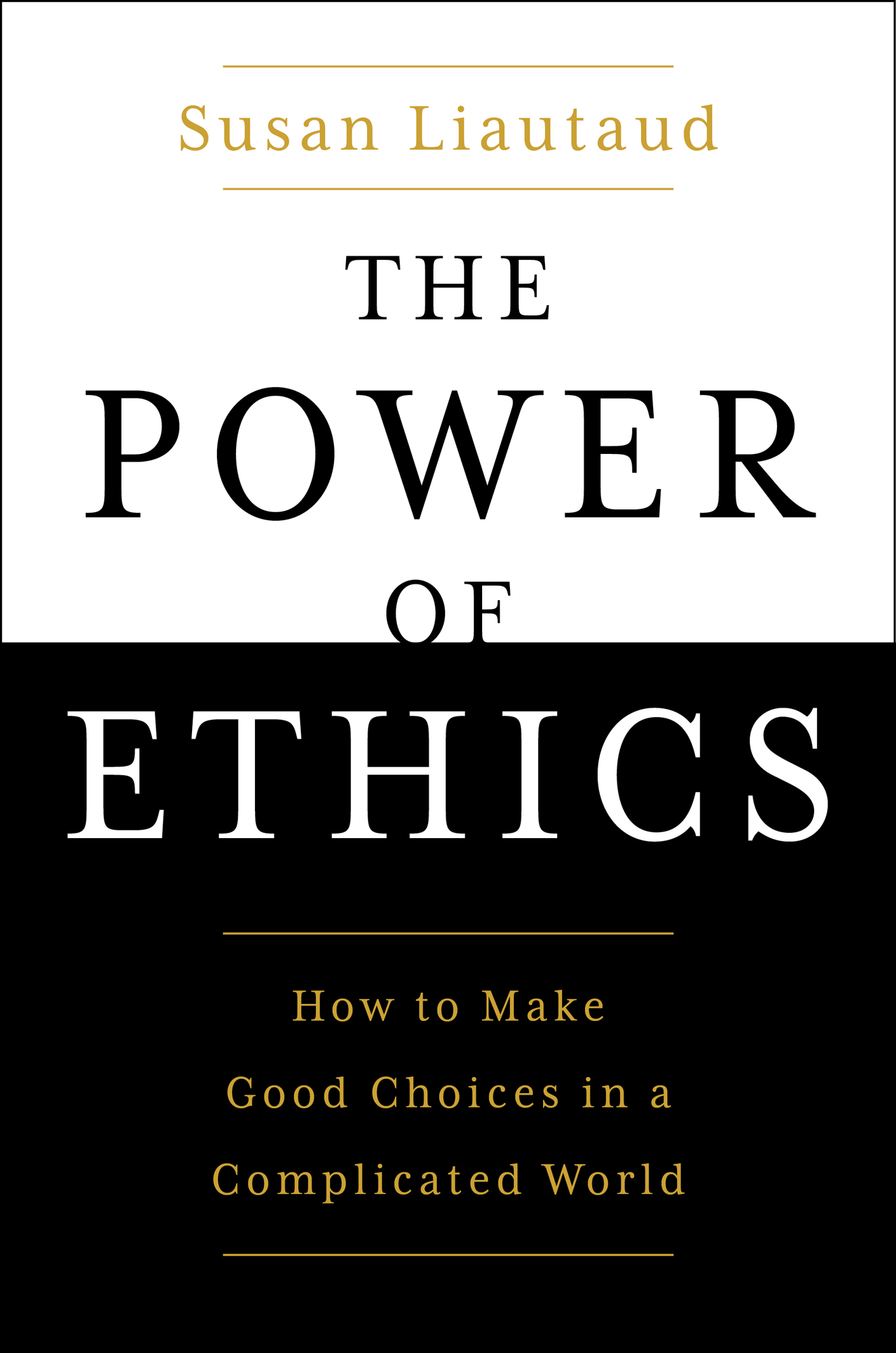

How to Make Good Choices in a Complicated World

Simon & Schuster
1230 Avenue of the Americas
New York, NY 10020
www.SimonandSchuster.com
Copyright 2021 by Susan Liautaud
All rights reserved, including the right to reproduce this book or portions thereof in any form whatsoever. For information, address Simon & Schuster Subsidiary Rights Department, 1230 Avenue of the Americas, New York, NY 10020.
First Simon & Schuster hardcover edition January 2021
SIMON & SCHUSTER and colophon are registered trademarks of Simon & Schuster, Inc.
For information about special discounts for bulk purchases, please contact Simon & Schuster Special Sales at 1-866-506-1949 or .
The Simon & Schuster Speakers Bureau can bring authors to your live event. For more information or to book an event, contact the Simon & Schuster Speakers Bureau at 1-866-248-3049 or visit our website at www.simonspeakers.com.
Interior design by Lewelin Polanco
Jacket design by David Litman
Library of Congress Cataloging-in-Publication Data has been applied for.
ISBN 978-1-9821-3219-4
ISBN 978-1-9821-3221-7 (ebook)
To Luca, Olivia, Parker, Alexa, Cristo, and Bernard: This is for you.
And for all of you who try hard to make ethical choices: my deepest admiration and hope that this book will support you and give you the courage to create your best stories.
 THE EDGE OF ETHICS
THE EDGE OF ETHICST he young woman was in her early thirties, tall and dark haired, with a direct and unwavering gaze. As she walked down the hall toward me, I could see the deep scars and broken facial bones that had never properly healed. Someone, maybe a partner or family member, had done that to her. I extended my hand in greeting.
It was 1989. I was twenty-six, studying law at Columbia University and leading a student public-interest advocacy group that raised funds and then dispensed small grants to nonprofit organizations. An inspiring local agency that assisted abused women in danger was a potential grantee. We had read about their programs and, if memory serves, that evening we invited this brave woman to come and tell her story.
As she and I neared the door to the classroom where we had all assembled, I paused. Can you please give me a minute? I said. I just want to make sure everyone is ready.
Inside, I looked at our small group gathered and explained that our speaker that evening had suffered more than we would likely be able to understand and more than would be appropriate for us to ask about. I wanted to prepare my classmates for the gravity of her injuries. For the next hour we listened as she recounted her story.
Somewhere between the letter of the law and the enforcement of court orders, the legal system had let her down in a life-threatening way. We learned that her main legal recoursea restraining order against her abuserwas difficult to obtain until after she reported significant physical injuries on several occasions and endured severe emotional distress. Having to prove she had been harmed to obtain legal protection against being harmed: that seemed illogical and unjust to me. I struggled to understand how this could be.
I grew up believing that by and large the rule of law protected and guided usfairly, effectively, and even compassionately. I was only beginning to understand that even where the law is clear and the courts are accessible, the legal system can still fall short. I also started to see that even where the law does offer protection, it is on all of us to hold ourselves to a higher standard.
I wasnt calling it ethics at the time, and I certainly wasnt thinking about a career in ethics, but I was searching for a way to improve the choices we make, individually and collectively.
For many years, my mantra has been: Ethical decision-making tethers us to our humanityit helps us keep human beings front and center at all times. My sincere hope is that The Power of Ethics will enable every reader to make human-centric choices that they can be proud of, both now and in the future.
We find ourselves at a pivotal moment, where the stakes for ethical decision-making are higher than ever. The importance of integrating ethics into our decisions affects all of daily life in the twenty-first centuryfrom whether we follow expert recommendations to protect our own and others health to our responses when we or a friend stumbles ethically. Our world is one in which ethical errors (and successes) are amplified. Misconduct spreads more widely and unpredictably, embeds itself more stubbornly, and entangles more individuals and institutions than ever before. Yet as counterintuitive as it may seem, we actually have more opportunities than ever before to make ethical decisions. To seize these moments, we have to appreciate what drives ethics on the edge.
Although I didnt realize it then, that meeting at Columbia Law School helped define my early thinking about the ethics edge. The edge is the line where the law no longer guides and protects us, leaving ethics as the lone standard by which to gauge our behavior. The edge is dynamic, and the space in which ethics becomes our only guide is expanding. In this zone, people, companies, innovations, and phenomena we may have never imagined would, could, or should intertwine in fact do. For instance, social media can connect us to our families, to friends, to job openings, and to learning about other cultures. It can also be a source of inaccurate medical information, hate-mongering, and bullying that spreads far and wide.
Why does the edge move, and why do unanticipated interconnections occur? First, the law lags behind the fast-moving changes in technology and innovation. Second, we face multiple global and systemic risksfrom climate change to the advent of fake news to pandemics. Third, new technologies and global risks join forces to amplify both modern and age-old dangers: Populism and extremism fuel threats to democracy and long-held democratic institutions, and societal ills like racism and sex trafficking emerge in technologically turbo-charged forms.
If we can integrate ethics into our everyday decision-making, we can better think about our place in the world. We can positively affect our relationships and our impact on the society around us. On the other hand, a failure to integrate ethics into our decisions is the most dangerously underestimated global systemic risk we facewhether as individual citizens, leaders, organizations, or nations. It is the existential threat at the source of so many others.
I have been teaching ethics courses at Stanford University since 2014. On the first day of my Ethics on the Edge class, I start with one question: Whats the story? What is really going on in the countless dilemmas we see in the news, at work, with our families and friends, and in the world around us? If we dont understand the forces driving ethics failures, we have little chance of preventing and remedying themand limited ability to create (and inspire) ethics successes.
Then, on the last day of class, I end with one question: Whats your story? Because I believe the degree to which we integrate ethics into our decision-making and ground it in reality determines our stories and impacts the stories of everyone else whose lives we touch, many of whom we may never meet.
Font size:
Interval:
Bookmark:
Similar books «The Power of Ethics: How to Make Good Choices In a Complicated World»
Look at similar books to The Power of Ethics: How to Make Good Choices In a Complicated World. We have selected literature similar in name and meaning in the hope of providing readers with more options to find new, interesting, not yet read works.
Discussion, reviews of the book The Power of Ethics: How to Make Good Choices In a Complicated World and just readers' own opinions. Leave your comments, write what you think about the work, its meaning or the main characters. Specify what exactly you liked and what you didn't like, and why you think so.

